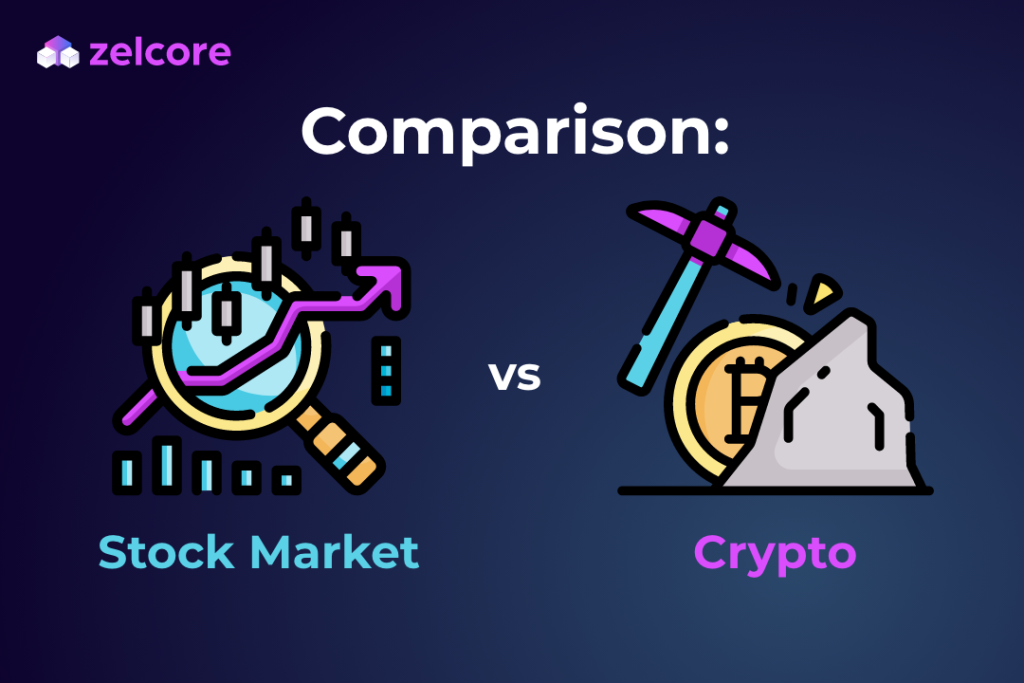Before the appearance of cryptocurrencies, stocks were the main type of assets for market investments. During the first couple of years after the launch of Bitcoin (BTC), the first cryptocurrency in the world, the stock market was incomparably larger than the crypto market. Few brokers and investors were willing to risk their cash by investing in a new class of financial assets that aren’t even backed by legal regulations and financial institutions.
Thanks to a small and dedicated community of crypto enthusiasts, cryptocurrencies like Bitcoin and Litecoin (LTC) started gaining popularity among developer teams, programmers, and tech-savvy individuals. When the first cryptocurrency exchange platforms were launched in 2010, stock brokers started trying out how Bitcoin works and including it in their portfolio of investments. Today, the cryptocurrency market is worth well over two trillion US dollars.
Let’s take a look at how stocks and cryptocurrencies work, and what are the differences between the stock market and the crypto market.
How do Stocks Work?
When you buy stocks, you’re buying a percentage of ownership in the company whose stocks you bought. This means that as the company’s value increases, so does the value of your stocks. The main reason why people buy stocks is that they hope that those stocks will dramatically rise in value at one point and prove to be a highly profitable investment.
This is what long-term stock investors do, they buy stocks and wait for their price to increase. However, experienced stock traders that engage in short-term investments or day trading usually buy a certain number of stocks and then immediately sell them when they can make a few percent of profits. There are various stock trading strategies but these are the basics.
How do Cryptocurrencies Work?
Stocks are based on traditional money, fiat currencies like USD and EUR, while cryptocurrencies aren’t backed by any laws or hard assets. Instead, the value of a cryptocurrency is determined by its use-cases, viability, popularity, adoption rate, and investments. If a cryptocurrency can be used to solve real-world business problems and it manages to gain widespread popularity among millions of people who accept it as a financial asset like Bitcoin, or any high market cap altcoin, then the project is considered a legitimate investment that won’t just suddenly crash.
Cryptocurrencies don’t use the traditional, centralized financial system to operate, because they rely on blockchain technology to facilitate fast transactions and many crypto projects offer much more services than just digital payment capabilities. Crypto ecosystems like Solana (SOL), Ethereum (ETH), and Cardano (ADA) are interesting examples of cryptocurrencies that offer developers loads of programing resources based on smart contracts, which can be used to launch decentralized applications.
Cryptocurrencies don’t exist physically, which is a huge advantage over fiat money, because they can be used for much more than just payments. Many cryptocurrencies are used as utility tokens for decentralized apps in industries such as decentralized finance, data storage, supply chain management, gaming and software development. A cryptocurrency can power all sorts of transactions on its native blockchain, while transcending national boundaries and limitations set by central banking systems and governments. In terms of storage, crypto coins and tokens are kept in cryptocurrency wallets. These wallets are specialized applications, where users store their private keys, which serve as passwords that prove ownership over a certain amount of assets.
The fact that cryptocurrencies aren’t regulated by centralized financial institutions makes them far more flexible than fiat money but they are also potentially far riskier due to their unpredictable price fluctuations.
Stock Market vs Crypto
The key similarity between the stock market and the crypto market is that both offer investment opportunities in assets that could prove highly profitable or a total investment disaster. However, multiple characteristics show how very different these two asset classes really are.
Market Regulations
The stock market is fully regulated, which means that stock exchanges such as the NASDAQ stock exchange, New York Stock Exchange, and Euronext are operating according to local and international financial laws and agreements.
In the case of the cryptocurrency market, the situation is entirely different. Any developer team from any part of the world can use open source software and create their own crypto token on an existing blockchain such as the Ethereum blockchain and launch their cryptocurrency on the market. There are over 400 cryptocurrency exchange platforms and many of the less popular platforms have little or no regulatory procedures for enlisting new coins and tokens. This is why it’s important to always use reliable cryptocurrency exchange platforms which are legally regulated and offer their users protection from potential scam projects.
Market Volatility
Investing in stocks can be risky if you choose to invest in relatively new and unknown companies that don’t have a track record of market success. If you invest in companies that are already established and recognized on the market, your investment is potentially safer.
With cryptocurrencies, there isn’t any stability, unless you invest in stablecoins such as Tether (USDT) or USD Coin (USDC), because cryptos are extremely volatile assets whose price is known to dramatically change in a short period of time. It isn’t uncommon for a cryptocurrency’s price to jump or crash several tens of percent in a single day. The risk is much higher when investing in cryptocurrencies, compared to stocks, but the potential profits are also higher.
Potential Profits
In order to gain serious profits from stocks, you need to invest a lot of money, while a relatively small investment in the right cryptocurrencies can mean enormous profits in a couple of years. For example, someone who invested 100 USD in Bitcoin when it was worth 1 USD per coin has become a millionaire nowadays when the price of BTC is over 50,000 USD per coin.
Conclusion
The cryptocurrency market offers far more excitement and higher profits compared to the stock market, but nevertheless investing in cryptos is always very risky, so never invest more than you’re prepared to lose.
